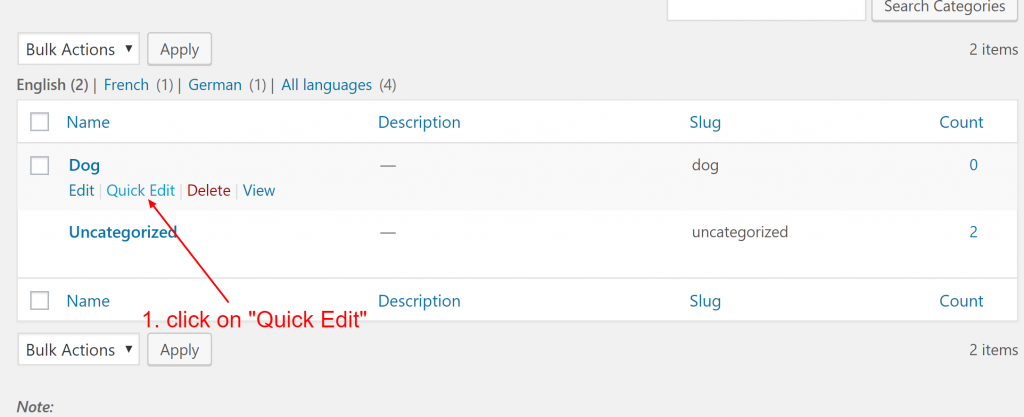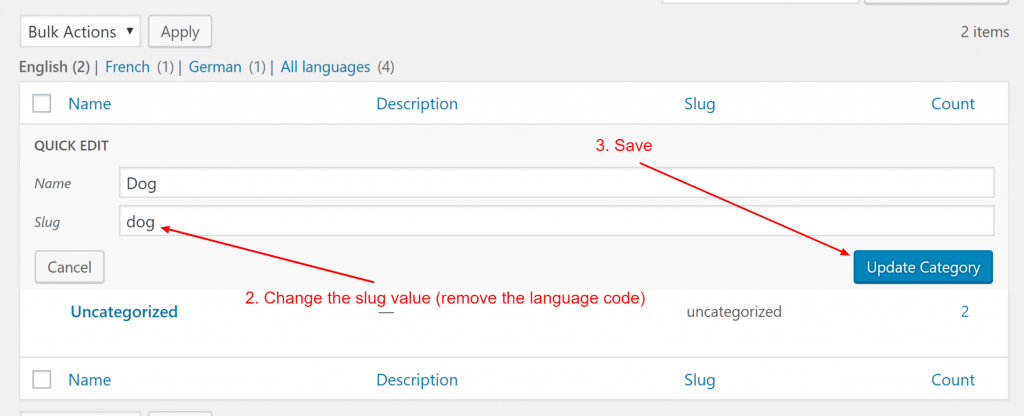Resolved
Resolved in: WPML 4.8.0
Overview of the issue
Translating a term with the same slug as the original term will automatically add a suffix with the language code. This is because WordPress API does not allow to have more than one occurrence of a slug for a specific taxonomy.
Here’s an example of what we expect:
– http://example.org/city/paris/
– http://example.org/fr/city/paris/
Currently, a language suffix is automatically added to the translated term => http://example.org/fr/city/paris-fr/.
Workaround
As a workaround, you can use the following steps (or watch a screencast of the workaround):
- create the term first
- update it with the “quick edit” link
- change the slug value and click Update {Taxonomy name}



Good that it is logged. Here it is described what the erroneous situation is. Good.
Could you please also explicitly declare what the required functionality is, as that is not clear here.
And maybe provide an example with a default language and translation language, where the suffix is automatically added?
Hi minis,
Indeed this wasn’t so clear so I updated the title and the description. Does it makes sense to you now?
You’re wonderful Pierre! Yes, a lot clearer. Thanks.
When adding an identical term to a post on the post edit screen, the term is not added with a language suffix, but the original term (in another language!) is used.
The adding of an identical term only works correctly from the term overview admin page.
Hi @erikD-2,
I think the trouble you are facing is specific to post tags. We reported this recently in https://core.trac.wordpress.org/ticket/45121#ticket. This is because post tags are handled as names (not IDs) in the save process.
If this is a wider issue, could you please open a support ticket so we can investigate?
Thanks,
Pierre
I’ve found a workaround for this.
Add the category with the translation service
After it’s added, go to the language tab in the category overview and use ‘quick edit’, this will allow you to use the same slug.
Whoops I read over the workaround
Sorry can you be more detailed about this workaround, i have some problem to follow all the step.
Thank you!
Hi @Marco,
I added some screenshots in the workaround. Let me know if it helps!
Thanks,
Pierre
I cant send the screenshot here but this workaround doesnt work for me.
My step:
– created a new taxonomy (eng translation) with differente name and NO SLUG
– SLUG automatically ADDED succesfully with the “-ENG” suffix or a number
– click on a QUICK EDIT and modify the SLUG at the same name of the other language
– get an error from WORDPRESS who avoid to rename it because its already used from another taxonomy
You miss one step.
Here its the correct order:
– WPML > TAXONOMY TRANSLATE : and add the language of the new taxnonomy
– when the popup jump out COPY THE SAME SLUG from the language source with the copy button
– moving to the category taxonomy and follow the step showed in the screenshot
But after, in the result page, i get ZERO RESULT and NO TRANSLATION.
Seems the TAXONOMY do not catch the database or the original taxonomy (who are now the same)
Hi Marco,
I invite you to open a support ticket on the forum and a supporter will provide you with the needed assistance.
Please include your debug information, and a temporary access to your site (if you wish).
Thanks,
Pierre
Hi Marco,
I added a screencast of the workaround in the description. If you are still experiencing issues, please open a support ticket.
Thanks,
Pierre
Hi everybody,
This issue is solved ?
Thanks
Didier
Hi, no this is not added to WPML yet. It’s on the list of our features but I do not have an estimation for when can it be added.
Hi everyone,
I am having the same issue as well.
My url goes from “/blog” for the English version, to “/blog-de” for the German version.
If I try to edit it to “/blog” for the German version (wpml–> taxonomy translation –> category translation),
WPML still creates and alternative version of the slug.
Hello there,
In that case, please follow the workaround, it should help.
Hi, I was wondering if there is a fix for this in the make or still no news? Thank you.
Hey there,
Unfortunately, we still don’t have a fix for this. Devs plan to add it in the next big release cycle, however, it totally depends on their developing roadmap.
We will keep this erratum updated.
Regards
I really have to say that it is quite sad how long that issue is actually there and for how long the implementation by the Core team is already done (5 years). Any news/timeline on that matter?
Hey there,
Unfortunately, we still don’t have a fix for this. Devs plan to add it in the next big release cycle, however, it totally depends on their developing roadmap.
We will keep this erratum updated.
Regards
When your “Big Release” is out i believe by then wordpress will already have implemented native multilingual support, so no need for the devs to tire themselves out on the existing issues, let them take a break.
You are right, hope they release wordpress phase 4 soon that will have native multilingual support in the core
If I had seen this problem that hasn’t been solved for 6 years, I definitely wouldn’t give 100 euros. Does anyone in the development team know what 6 years is?
Hello,
No this is not added to WPML yet. It’s on the list of our features request and the dev team is aware of it but we do not have an estimation for when can it be added.
Its funny how many of the issues with WPML you start with the thread 2020 and ends in 2024 and you see the typical following answer “It’s on the list of our features request”
Truly looking forward to Phase 4 of wordpress with native multilingual support in the core so we can skip all the issues with WPML and the extremly slow progress, i wonder what the developers are up to… seem to be to lazy no beeing able to solve several issues that have existed for several years.
We understand your frustration but some fixes may take longer than others, however this is already in our devs roadmap.
We will keep this erratum updated.
Regards
we are 2025, that is 7 years later than when the issue was highlighted, this should be the number 1 priority to fix
We understand your frustration. This issue is still on our development roadmap, and we’ll update this erratum as soon as there’s progress to share.
Thank you for your patience.
I’m waiting for them to fix another issue too, I got the impression that their support does not involve the developers and issues do not get resolved in future versions.
I totally understand that you want to see this feature added into WPML, however we can assure you that it has’t been neglected and it has been escalated internally.
We will keep this erratum updated.
Any update on this?
Hello Fabian,
We don’t have any news so far. We will keep this page updated.
Regards
This solution is not usable anymore, you should remove it. After 4.7 quick edit was disabled by WPML. it now says:
“Quick edit is disabled for product translations. Manage product translations from the Translation Dashboard.”
Hello there,
I gave it a try on this Sandbox and the workaround is still valid. As you can see on this page, you can use the Quick edit option and manually update your category slug. Does it work for you?
Are there any risk using the Workaround?
We plan to translate to several languages and value to have the best possible URL-structure for SEO why slug-url is important.
Hello Mathias,
Yes, you can safely use this workaround. It has been in place for several years now.
Thanks! Are there any well known problems we might experience using this workaround?
For example, one of our pages slug-url was renamed from /contact to /contact-2 and when we changed the link to the same name (/contact) and set one of the translations to be a “draft page” both became draft/unpublished.
No, this workaround has been in place for many years and is safe to use.
Regarding slugs, a general best practice in WordPress is to avoid using the same slug for different types of content. For example, if you have a page with the slug
/product/, WordPress may struggle to resolve URLs like/product/product-name/, as it won’t know whether it’s referring to a product or a subpage.For your specific case, if the slug has a “
-2” suffix, it means that another page is already using the original slug (/contact). This could be a trashed page, so check your trash and permanently delete it (go to Trash > Empty Trash) to free up the slug.As for the translation status, you can control how translated pages behave in “WPML > Settings > Translated documents options”. I recommend setting it to “Publish translated posts when the original is published” to keep them in sync.
To further optimize your slugs for SEO, you can also adjust how translated URLs are generated. In the same “Settings” section, under Page URL settings, you can choose “Translate” instead of the default auto-generated option. This allows you to manually translate/edit slugs in the WPML Translation Editor, giving you more control.
Hope these tips help!
Hi,
I’d like to share a working workaround that solved the problem for me when using identical slugs for taxonomy terms across different languages in WPML.
As currently WPML doesn’t support having the same slug for translated terms (it always resolves the default language term if the slug is duplicated), this simple fix ensures the correct translated term is used on the front-end archive pages:
add_action(‘template_redirect’, function () {
if (!is_tax([‘portfolio_categories’, ‘portfolio_tags’])) return;
$current_lang = apply_filters(‘wpml_current_language’, null);
$original = get_queried_object();
if (!$original || empty($original->term_id)) return;
$translated_id = apply_filters(‘wpml_object_id’, $original->term_id, $original->taxonomy, false, $current_lang);
if (!$translated_id || $translated_id == $original->term_id) return;
$translated = get_term($translated_id, $original->taxonomy);
if (is_wp_error($translated) || !$translated) return;
global $wp_query;
$wp_query->queried_object = $translated;
$wp_query->queried_object_id = $translated->term_id;
});
What this does:
• Forces WPML to load the translated term on the archive page, even if the slug is the same across languages.
• Allows keeping clean, consistent URLs like:
• /portfolio-tags/agrobiznes/ (default)
• /en/portfolio-tags/agrobiznes/ (translated)
Tested on WPML 4.6+ with custom taxonomies.
If you’re okay with doing this on the template level and don’t rely on identical slugs in the admin or REST, it’s a clean and reliable workaround until WPML natively supports this use case.
Hope it helps someone else.
Hi Vitalii,
Thanks for sharing your custom code!
However, I don’t think it resolves the core issue: WordPress doesn’t allow identical slugs within the same taxonomy. Which is why WPML appends the language suffix by default. If you want similar slugs across different languages, you’ll still need to manually adjust them as described above.
Also, you shouldn’t need custom code just to retrieve the translated term in the secondary language. I’ve set up a sandbox site (available for 14 days) to test this:
Category Two – Default behavior (with language suffix)
– Original: https://pretty-didgeridoo.sandbox.otgs.work/portfolio_categories/categorytwo/
– Translation: https://pretty-didgeridoo.sandbox.otgs.work/fr/portfolio_categories/categorytwo-fr/
Category One – Using our workaround to get the same slug
– Original: https://pretty-didgeridoo.sandbox.otgs.work/portfolio_categories/categoryone/
– Translation: https://pretty-didgeridoo.sandbox.otgs.work/fr/portfolio_categories/categoryone/
Hello everyone,
Just to let you know that this issue should be solved with WPML 4.8.0 recently released.